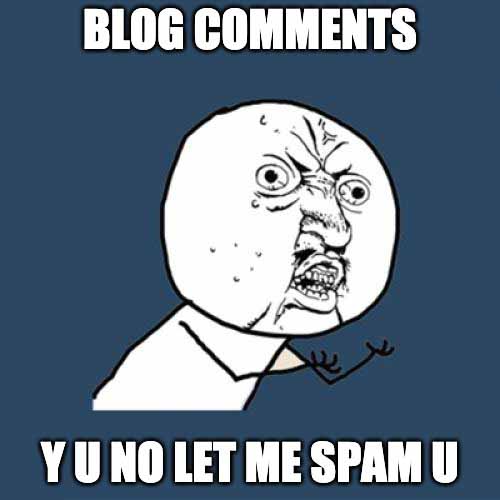
Many blogs (most blogs?) allow people to comment on them. This one does not. Why? Some of it is technical, but it’s mostly due to my experiences over the past 20 years dealing with blog comments. For media channels or “idea marketplace” types of sites where full-time editorial effort attracts large audiences, part of their value lurks in the conversations that orbit various topics and posts. For home-grown low-traffic places like this one, however, it’s usually just a bunch of crap.
For example: elsewhere on the Internet, I manage a Wordpress site with more traffic than here but nothing that would be worth the Google Analytics. The comments module is enabled, but all comments get pushed into “moderation purgatory” and will never be made visible without me manually approving them. Last month, this other site had 679 egregiously spammy comments and zero real comments. When you give $5 to an SEO expert on Fiverr, this is probably part of what you’re buying: a person and a bot farm, spamming Wordpress sites, searching for security loopholes that will allow them to plant links to customer sites in a ridiculous effort to boost a page’s perceived “authenticity” to Google.
Or worse, they’d like to sell you some fake generic Viagra or fentanil.
The whole thing’s pretty absurd, really, and it’s been repeating itself for centuries. For in any large enough congregation of people, you will find some number of fools and foolers. Laws only matter when the will to enforce, and the means to assert power, are both present; for we are not all born with a moral compass, let alone ones that point in the same direction. Before comment spam there was (is) email spam, Nigerian kings, Yahoo! stock message board pump-and-dumps, insurance scams, fake Floridian real estate, literal snake-oil, traveling insurance salesmen, amazing build-it-yourself kits in the backs of magazines, Made for TV plastic crap, placebo vitamins, poisons that cure ills, fictions that proclaim the truth.
All of these schemes rely on some degree of greed, on the part of both fool and fooler. The fooler sees an equation where the cost of finding a fool and the relative risk is much smaller than the value of a transaction. This is obvious when thinking about clearly fraudulent things, but also applies to products of, shall we say, dubious value. It is not illegal, for example, to sell 1000mg Vitamin C tablets and to talk about the critical nature Vitamin C may play in human health and the immune system, but it’s manipulative to suppress the equally important knowledge that our kidneys are going to piss out all of that Vitamin C and that none of it lingers.
In truth, marketing’s only purpose is behavior modification; it’s just a question of how large of a change you’re trying to inspire and how that new behavior helps or harms. We tend to push back against marketing that asks us to do things we see as harmful to ourselves or others in our various tribes, but aren’t equally judgmental of the marketing that reinforces our biases. And yet, without the street barker how would we ever know where to buy our food? What’s the difference between “good” marketing and “bad” marketing? It’s more subjective than it seems.
And so: no comments here. I’m happy to have conversations with anyone who’s sincerely interested in chatting, which is why I link over to my Twitter BlueSky and Patreon profiles where you can say “hi!” in an environment designed for that. And if you’ve got something you’d like to add to or respond to from one of the pages here, I’ll happily incorporate it…as long as it’s not commercial in nature.